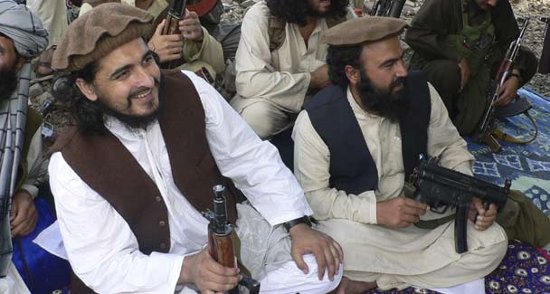|
|
|
Hakeemullah and Waliur Rehman Mehsud, before the Pakistani Army launched the South Waziristan offensive. |
A Pakistani Taliban commander confirmed that the government and the Taliban are conducting peace talks. From Reuters:
The discussions are focused on the South Waziristan region on the Afghan border and could be expanded to try to reach a comprehensive deal if progress is made.
The Taliban, who are close to al Qaeda, made several demands, including the release of prisoners and the withdrawal of Pakistani forces from South Waziristan, said the commander.
An ethnic Pashtun tribal mediator described the talks as “very difficult.” Pakistani military and government officials were not immediately available for comment.
“Yes, we have been holding talks, but this is just an initial phase. We will see if there is a breakthrough,” said the senior Taliban commander, who asked not to be identified.
“Right now, this is at the South Waziristan level. If successful, we can talk about a deal for all the tribal areas,” he said, referring to Pashtun lands along the Afghan border.
According to The Washington Post, South Waziristan leader Waliur Rehman Mehsud is leading the talks for the Taliban.
None of this should come as a surprise. The Pakistani government put out feelers for peace talks earlier this fall, and both Waliur Rehman and Faqir Mohammed responded favorably [see LWJ report, Pakistani Taliban signal willingness to conduct peace talks].
Pakistan has signed numerous peace agreements with the Taliban in the past decade, only to have them collapse. The peace agreements allowed the Taliban to expand their areas of control in the tribal areas, and even into settled districts like Swat. The deals have also extended al Qaeda’s reach in the tribal areas.
US officials have criticized Pakistan for seeking peace with their Taliban, yet have pursued the same policy in Afghanistan, thinking that the Afghan branch will abide by terms the Pakistani branch never intended to honor.
Are you a dedicated reader of FDD's Long War Journal? Has our research benefitted you or your team over the years? Support our independent reporting and analysis today by considering a one-time or monthly donation. Thanks for reading! You can make a tax-deductible donation here.









5 Comments
The Pakistani Taliban ups the ante.
Associated Press: Pakistani Taliban declare nationwide cease-fire
“…thinking that the Afghan branch will abide by terms the Pakistani branch never intended to honor.”
Spot on, yet the AP is glowing with their assessment of a “new” peace deal.
Pakistan has signed numerous peace agreements with the Taliban in the past decade, only to have them collapse. The peace agreements allowed the Taliban to expand their areas of control in the tribal areas, and even into settled districts like Swat. The deals have also extended al Qaeda’s reach in the tribal areas.
This is the Pak Army plan to keep the western flank secure from the dreaded Indians!
So the complaints we heard from the Taliban came in the context of ongoing negotiations.
The Haqqanis are not negotiating with the Paks because they are already at peace with them. So no need to complain.
“The commander said the cease-fire has been in effect for the past month and was valid throughout the country”
Oh sure! In the last three weeks, Bill’s “Today In” has reported 13 Taliban attacks inside Pakistan. None of these are in the last week, but that might be an editorial effect.
November 13: The Taliban killed 16 people in a pair of bombings in Khyber, and bombed two schools in Swabi and Nowshera
November 12:Five security officials and five militants were killed during fighting in Jhelum in Punjab province; one report said that the fighters were from Lashkar-e-Jhangvi. The Taliban killed a policeman in a rocket attack in Shabqadar
November 10:Four members of a pro-government militia and two Lashkar-e-Islam fighters were killed in a clash in Khyber
November 7:The Taliban killed four people, including a pro-government tribal leader, in separate attacks in Bajaur and South Waziristan. The Taliban also killed a political leader and his bodyguard in a bombing outside a mosque in Swabi.
November 6:The Taliban killed five Pakistani soldiers in Makeen in South Waziristan; unconfirmed reports claimed up to 15 soldiers were killed.
November 2:The Taliban killed two soldiers in a bombing in Mohmand and a civilian in a bombing in Peshawar.